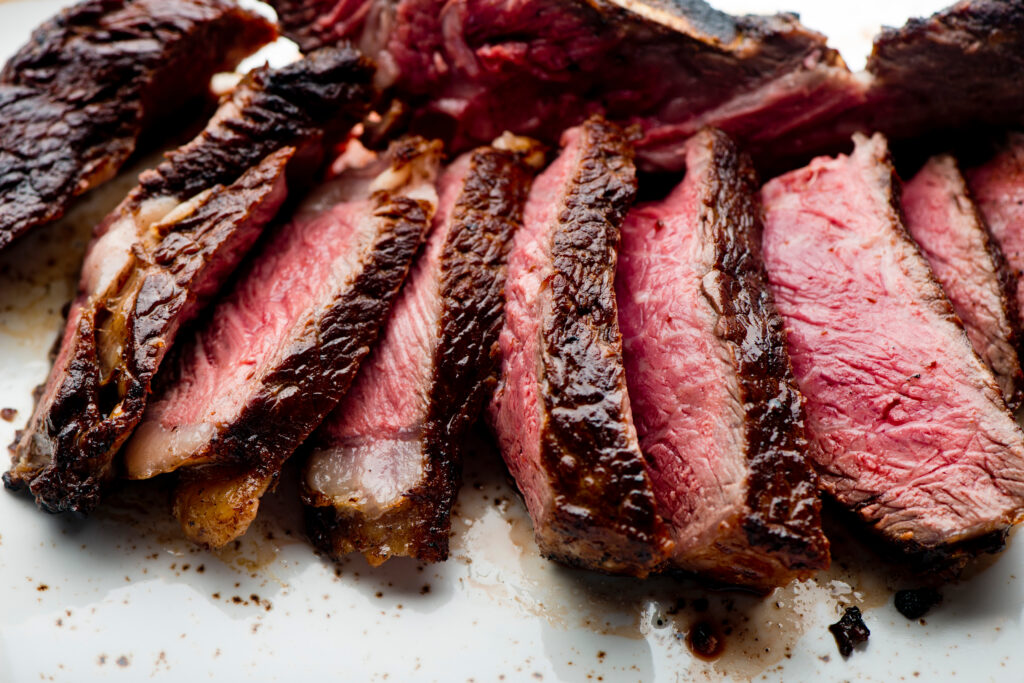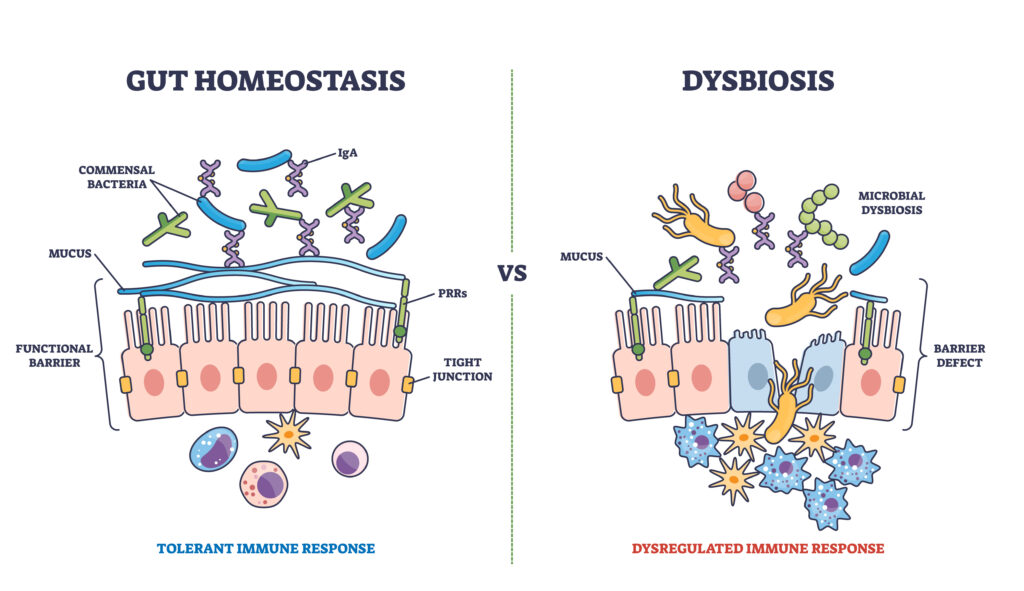Can Inflammation Cause Weight Gain – Reversing Inflammation Is Key To Losing Weight
I am asked all the time, “can inflammation cause weight gain”, and the answer is a definite yes. When inflammation becomes chronic, it leads to serious health issues like heart disease, obesity, and autoimmune conditions.
Chronic inflammation has been linked to unwanted weight gain and even metabolic syndrome. Metabolic syndrome is a cluster of conditions that increase the risk of heart disease, stroke, and insulin resistance. These conditions include increased blood pressure, high blood sugar levels, excess body fat around the waist, and abnormal cholesterol levels.1
How Can Inflammation Cause Weight Gain?
Studies have shown that inflammation disrupts the signaling pathways in our body that regulate appetite, metabolism, and fat storage. This disruption leads to increased food intake, decreased energy expenditure, and excessive fat accumulation. In addition, chronic inflammation causes changes in the gut microbiome, which plays a crucial role in regulating weight.
Choosing An Anti-Inflammatory Diet To Prevent Weight Gain
One of the main culprits behind chronic inflammation is a diet high in processed and sugary foods. These types of foods cause spikes in blood sugar and trigger the release of inflammatory molecules in the body. Moreover, they also contribute to weight gain directly by providing excess calories.2
Read more about the health-damaging effects of sugar.
Processed and sugary foods are low in nutrients, which can further contribute to chronic inflammation. Nutrient deficiencies have been linked to increased levels of inflammatory markers in the body. In particular, inadequate intake of antioxidants and omega-3 fatty acids has been associated with higher levels of inflammation.3
The first step to combating chronic inflammation is to consume a diet that is rich in whole, organic, unprocessed foods. This includes fruits, vegetables, grass-fed meat, fatty wild-caught fish, and healthy fats like olive oil. These foods are high in nutrients and antioxidants that help reduce inflammation in the body.
For more information on an anti-inflammatory diet, check out my Cellular Healing Diet.

Enhance Fat Loss By Consuming Glutamine-Rich Foods
In addition to aiding in muscle recovery and supporting a healthy immune system, glutamine-rich foods also play a role in promoting fat loss. Glutamine is an amino acid that plays a crucial role in various bodily functions, including metabolism and digestion.
One way that glutamine promotes fat loss is by helping to regulate blood sugar levels. When our blood sugar levels are stable, our body is less likely to store excess glucose as fat. Glutamine also helps to reduce cravings for sugary and high-carbohydrate foods, which leads to overeating and weight gain.4
Furthermore, glutamine has been shown to increase the production of human growth hormone (HGH), which aids in fat loss by increasing metabolism and promoting the breakdown of stored fat for energy. This makes glutamine-rich foods a valuable addition to a weight loss diet. Some examples of glutamine-rich foods include meat, spinach, cabbage, and poultry.5
Microbiome Dysbiosis And Weight Gain
The human body is home to trillions of microorganisms, collectively known as the microbiome. These microbes play a crucial role in maintaining our overall health and well-being. However, when there is an imbalance or dysbiosis in the microbiome, it leads to various health issues, including weight gain.6
Dysbiosis refers to an imbalance in the types and numbers of bacteria present in the microbiome. This imbalance can be caused by factors such as diet, lifestyle, medications, and environmental influences. When there is dysbiosis in the gut microbiome specifically, it can lead to changes in metabolism and inflammation, which are both linked to weight gain. Specifically, chronic inflammation due to dysbiosis contributes to insulin resistance and metabolic dysfunction.7
One of the main ways that dysbiosis contributes to weight gain is through changes in metabolism. The gut microbiome helps to break down and digest food, which affects the amount of energy and nutrients that are absorbed from our diet. When there is an imbalance in the types of bacteria present in the gut, it leads to reduced efficiency in breaking down certain foods, resulting in more calories being absorbed, leading to weight gain.8

Furthermore, the gut microbiome has been found to have an impact on our food cravings and satiety signals. Studies have shown that dysbiosis influences the production of certain hormones, such as ghrelin and leptin. When these hormonal signaling pathways are disrupted due to dysbiosis, it leads to increased food cravings and a decreased ability to feel satisfied after meals.9
Read more about optimizing fat loss hormones.
Optimize Fat Loss With Fermented Foods
Fermented foods contain probiotics, which are beneficial bacteria that help improve the balance of gut microbiota. This leads to improved digestion and metabolism, making it easier for your body to burn fat. Fermented foods contain anti-inflammatory properties that reduce inflammation in the body and aid with weight loss.
Many fermented foods, such as sauerkraut and kimchi, are low in calories but still provide a satisfying flavor. This allows you to enjoy tasty foods without consuming excess calories. Fermented foods contain phytochemicals that can help regulate hormones. The healthy bacteria present in fermented foods improves digestion and promotes proper nutrient absorption. This aids with weight loss while also supporting overall health and well-being.10
How Can Inflammation Cause Weight Gain – Hormone Resistance
Hormones are chemical messengers in the body that regulate various physiological processes, including metabolism and appetite control. When our body is inflamed, it produces a type of hormone called pro-inflammatory cytokines. These cytokines can impair the function of insulin and leptin, two important hormones involved in weight management.11
Insulin is responsible for regulating blood sugar levels and promoting fat storage in the body. Inflammation causes a decrease in insulin sensitivity, making it less effective at controlling blood sugar levels. As a result, the body produces more insulin to compensate, leading to weight gain.12
Leptin is known as the “satiety hormone” because it signals to the brain when we are full and should stop eating. Inflammation interferes with leptin’s ability to communicate with the brain, causing a condition known as leptin resistance. This means that the body does not receive the signal to stop eating, leading to overeating and weight gain.13
Read more about leptin resistance.
How Can Inflammation Cause Weight Gain – Toxins Like Heavy Metals
Toxins like heavy metals and pesticides contribute to inflammation in our bodies that leads to hormone resistance and weight gain. Heavy metals, such as lead, mercury, cadmium, and arsenic, are known for their toxic effects on the body. They disrupt normal cellular processes, leading to oxidative stress and cellular membrane inflammation.14
The cellular membrane plays a crucial role in regulating the interaction between hormones and their respective target cells. When the cellular membrane is inflamed, it becomes thicker and less permeable. This means that hormones have a harder time binding to their receptors on the cell surface and delivering their messages. As a result, the body’s cells become less responsive to hormonal signals, leading to hormone resistance.15
Furthermore, toxins also accumulate in fat cells, which serve as a storage site for these harmful substances. As a result, the body may hold on to excess fat in an attempt to protect itself from the toxic effects of these substances. This makes it difficult to lose weight and maintain a healthy body composition.16
The only way to deal with toxic heavy metals is to remove them from the body.
How Can Inflammation Cause Weight Gain – Pesticides
Pesticides are another common source of toxins that can contribute to inflammation in the body. These chemicals are often used in agriculture to protect crops from pests, but they can also harm human health. Pesticides have been found to disrupt the endocrine system, which leads to inflammation and weight gain.17
What Other Factors Cause Inflammation And Weight Gain?
Aside from diet, other lifestyle factors such as stress, lack of sleep, and sedentary behavior can also contribute to chronic inflammation and weight gain. Stress, in particular, increases the production of cortisol, a hormone that promotes fat storage and appetite.18 19 20
Regular physical activity is crucial in reducing chronic inflammation and maintaining a healthy weight. Additionally, incorporating stress management techniques such as meditation or yoga, getting enough quality sleep, and reducing sedentary behavior all help in controlling inflammation and promoting weight loss.

Can Inflammation Cause Weight Gain – Reversing Inflammation Is Key To Losing Weight
Can inflammation cause weight gain? Yes, but we can reverse weight gain by getting to the cause of inflammation, effectively normalizing metabolism. By eating a healthy diet, staying physically active, removing toxins from the body, optimizing hormone function, managing stress, and getting enough sleep, we can keep inflammation at bay and maintain a healthy weight.
Read more about how to lose fat for good.
References
1 Fahed G, Aoun L, Bou Zerdan M, Allam S, Bou Zerdan M, Bouferraa Y, Assi HI. Metabolic Syndrome: Updates on Pathophysiology and Management in 2021. Int J Mol Sci. 2022 Jan 12;23(2):786. doi: 10.3390/ijms23020786. PMID: 35054972; PMCID: PMC8775991.
2 Ma X, Nan F, Liang H, Shu P, Fan X, Song X, Hou Y, Zhang D. Excessive intake of sugar: An accomplice of inflammation. Front Immunol. 2022 Aug 31;13:988481. doi: 10.3389/fimmu.2022.988481. PMID: 36119103; PMCID: PMC9471313.
3 Wierenga KA, Pestka JJ. Omega-3 Fatty Acids And Inflammation – You Are What You Eat! Front Young Minds. 2021;9:601068. doi: 10.3389/frym.2021.601068. Epub 2021 Aug 24. PMID: 35174177; PMCID: PMC8846546.
4 Hasani M, Mansour A, Asayesh H, Djalalinia S, Mahdavi Gorabi A, Ochi F, Qorbani M. Effect of glutamine supplementation on cardiometabolic risk factors and inflammatory markers: a systematic review and meta-analysis. BMC Cardiovasc Disord. 2021 Apr 17;21(1):190. doi: 10.1186/s12872-021-01986-8. PMID: 33865313; PMCID: PMC8053267.
5 Laviano A, Molfino A, Lacaria MT, Canelli A, De Leo S, Preziosa I, Rossi Fanelli F. Glutamine supplementation favors weight loss in nondieting obese female patients. A pilot study. Eur J Clin Nutr. 2014 Nov;68(11):1264-6. doi: 10.1038/ejcn.2014.184. Epub 2014 Sep 17. PMID: 25226827.
6 Breton J, Galmiche M, Déchelotte P. Dysbiotic Gut Bacteria in Obesity: An Overview of the Metabolic Mechanisms and Therapeutic Perspectives of Next-Generation Probiotics. Microorganisms. 2022 Feb 16;10(2):452. doi: 10.3390/microorganisms10020452. PMID: 35208906; PMCID: PMC8877435.
7 Zeng MY, Inohara N, Nuñez G. Mechanisms of inflammation-driven bacterial dysbiosis in the gut. Mucosal Immunol. 2017 Jan;10(1):18-26. doi: 10.1038/mi.2016.75. Epub 2016 Aug 24. PMID: 27554295; PMCID: PMC5788567.
8 DeGruttola AK, Low D, Mizoguchi A, Mizoguchi E. Current Understanding of Dysbiosis in Disease in Human and Animal Models. Inflamm Bowel Dis. 2016 May;22(5):1137-50. doi: 10.1097/MIB.0000000000000750. PMID: 27070911; PMCID: PMC4838534.
9 Leeuwendaal NK, Cryan JF, Schellekens H. Gut peptides and the microbiome: focus on ghrelin. Curr Opin Endocrinol Diabetes Obes. 2021 Apr 1;28(2):243-252. doi: 10.1097/MED.0000000000000616. PMID: 33481425; PMCID: PMC7924980.
10 Jalili M, Nazari M, Magkos F. Fermented Foods in the Management of Obesity: Mechanisms of Action and Future Challenges. Int J Mol Sci. 2023 Jan 31;24(3):2665. doi: 10.3390/ijms24032665. PMID: 36768984; PMCID: PMC9916812.
11 Martin SS, Qasim A, Reilly MP. Leptin resistance: a possible interface of inflammation and metabolism in obesity-related cardiovascular disease. J Am Coll Cardiol. 2008 Oct 7;52(15):1201-10. doi: 10.1016/j.jacc.2008.05.060. PMID: 18926322; PMCID: PMC4556270.
12 de Luca C, Olefsky JM. Inflammation and insulin resistance. FEBS Lett. 2008 Jan 9;582(1):97-105. doi: 10.1016/j.febslet.2007.11.057. Epub 2007 Nov 29. PMID: 18053812; PMCID: PMC2246086.
13 Dornbush S, Aeddula NR. Physiology, Leptin. [Updated 2023 Apr 10]. In: StatPearls [Internet]. Treasure Island (FL): StatPearls Publishing; 2024 Jan-. Available from: https://www.ncbi.nlm.nih.gov/books/NBK537038/
14 Haidar Z, Fatema K, Shoily SS, Sajib AA. Disease-associated metabolic pathways affected by heavy metals and metalloid. Toxicol Rep. 2023 Apr 24;10:554-570. doi: 10.1016/j.toxrep.2023.04.010. PMID: 37396849; PMCID: PMC10313886.
15 Straub RH. Interaction of the endocrine system with inflammation: a function of energy and volume regulation. Arthritis Res Ther. 2014 Feb 13;16(1):203. doi: 10.1186/ar4484. PMID: 24524669; PMCID: PMC3978663.
16 Jackson E, Shoemaker R, Larian N, Cassis L. Adipose Tissue as a Site of Toxin Accumulation. Compr Physiol. 2017 Sep 12;7(4):1085-1135. doi: 10.1002/cphy.c160038. Erratum in: Compr Physiol. 2018 Jun 18;8(3):1251. PMID: 28915320; PMCID: PMC6101675.
17 Gea M, Zhang C, Tota R, Gilardi G, Di Nardo G, Schilirò T. Assessment of Five Pesticides as Endocrine-Disrupting Chemicals: Effects on Estrogen Receptors and Aromatase. Int J Environ Res Public Health. 2022 Feb 10;19(4):1959. doi: 10.3390/ijerph19041959. PMID: 35206146; PMCID: PMC8871760.
18 Liu YZ, Wang YX, Jiang CL. Inflammation: The Common Pathway of Stress-Related Diseases. Front Hum Neurosci. 2017 Jun 20;11:316. doi: 10.3389/fnhum.2017.00316. PMID: 28676747; PMCID: PMC5476783.
19 Irwin MR, Olmstead R, Carroll JE. Sleep Disturbance, Sleep Duration, and Inflammation: A Systematic Review and Meta-Analysis of Cohort Studies and Experimental Sleep Deprivation. Biol Psychiatry. 2016 Jul 1;80(1):40-52. doi: 10.1016/j.biopsych.2015.05.014. Epub 2015 Jun 1. PMID: 26140821; PMCID: PMC4666828.
20 Ertek S, Cicero A. Impact of physical activity on inflammation: effects on cardiovascular disease risk and other inflammatory conditions. Arch Med Sci. 2012 Nov 9;8(5):794-804. doi: 10.5114/aoms.2012.31614. Epub 2012 Nov 7. PMID: 23185187; PMCID: PMC3506236.




